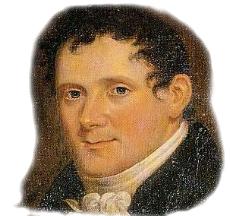|
|
(1775
- 1847)
O'Connell was born on August
6, 1775, near Cahirciveen,
County Kerry, and educated in France. He returned to Ireland, studied
law, and was admitted to the bar in Dublin in 1798. During the next
two decades he was active in the movement to repeal British laws that barred Roman Catholics from Parliament. In 1823 he organized
the Catholic Association, which played an important role in the
passage of the Catholic Emancipation Act six years later. O'Connell
entered the British House of Commons for County Clare in 1829, retaining
his seat until his death. O'Connell often allied himself with the
Whig party in Parliament. He became lord mayor of Dublin in 1841.
that barred Roman Catholics from Parliament. In 1823 he organized
the Catholic Association, which played an important role in the
passage of the Catholic Emancipation Act six years later. O'Connell
entered the British House of Commons for County Clare in 1829, retaining
his seat until his death. O'Connell often allied himself with the
Whig party in Parliament. He became lord mayor of Dublin in 1841.
As head of the Catholic Association he received
a large yearly income from voluntary contributions by the Irish
people, who supported him in a series of demonstrations in favour
of Irish home rule. After one of these demonstrations, in 1843,
he was arrested and convicted of seditious conspiracy, but the conviction
was subsequently reversed by the House of Lords, and he resumed
his career. In response to the national crisis caused by the Irish
Famine (1845-1849), younger members of O'Connell's party began to
advocate revolutionary doctrines that he had always opposed. Their
arguments in favour of violent opposition to British rule led to
an open split in Irish ranks in 1846. O'Connell, distressed by this
disaffection among the Irish and in ill health, moved to Genoa,
Italy, where he died on May 15, 1847.
One of O'Connell's most famous sayings was
'Human blood is no cement for the temple of liberty.' |